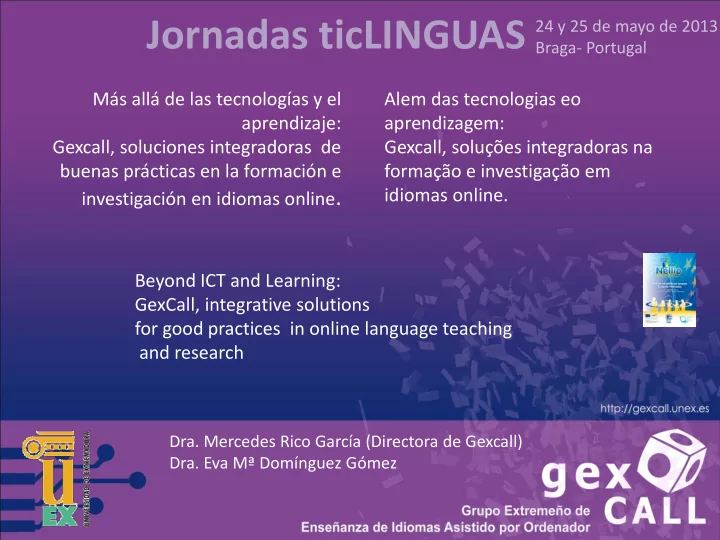

Jornadas ticLINGUAS 24 y 25 de mayo de 2013 Braga- Portugal Más allá de las tecnologías y el Alem das tecnologias eo aprendizaje: aprendizagem: Gexcall, soluciones integradoras de Gexcall, soluções integradoras na buenas prácticas en la formación e formação e investigação em investigación en idiomas online . idiomas online. Beyond ICT and Learning: GexCall, integrative solutions for good practices in online language teaching and research Dra. Mercedes Rico García (Directora de Gexcall) Dra. Eva Mª Domínguez Gómez
Presentación Presentation Presentação 10 años de Gexcallers 2003-2013 GexCALL is based on the unification of differing scientific El grupo GexCALL surge mediante la vinculación de areas, forming an interdisciplinary core for study and diferentes áreas científicas en un núcleo research, which include linguists, computer science interdisciplinar de estudio e investigación que incluye experts, design professionals, mathematicians and lingüistas, informáticos, profesionales del diseño, statistic experts, all working under the auspices of the matemática y análisis estadístico trabajando en la information technologies dedicated to the teaching of integración de las tecnologías educativas en la modern languages through computer support and the enseñanza de idiomas y en el diseño y creación de design of hypermedia language learning systems. sistemas hipermedia para el aprendizaje lingüístico. Grupo de Investigación de la Universidad de Extremadura e Inscrito en el Gobierno de Extremadura. http://gexcall.unex.es
Presentación Presentation Presentação Gexcall online Gexcall en la red Gexcall Official websites Páginas oficiales de Gexcall Information dissemination Difusión de la información
CONVOCATORIAS EUROPEAS _Proyectos Projects Projetos Nellip (2011_2014) Network of European Language Labelled Intiatives and Projects Language Labells Awards http://nellip.pixel-online.org/info/
Award of the European Language Label • Since the beginning of the European Language Label a common feature of every edition of the initiative has been the improvement of language learning, bringing Europe closer together through increasing understanding the diversity of languages and cultures among and within member states. • In Spain winning initiatives are from 1999 to the present are available at www.oepee.es/oapee/inicio/sello-europeo/historico- premiados0.html • The analysis of these initiatives provides an overview of the priorities taken into account when each European Language Label was awarded.
The European Language Label in Spain • What are the Objectives? – The objective of the awards is to promote newly recognized examples of innovative practice in order to share experiences within the field of teaching and learning of languages .
PRIORITIES Language learning based on the new technologies • This innovative learning/teaching system should combine the inspiration and motivation of traditional classroom teaching and the flexibility of online or distance learning to create courses that are accessible and motivating for today's students, who develop their autonomy, interact by way of a computer with teachers "on the other side of the screen" and have fun while learning a foreign language. Multilingual Classrooms The racial and cultural map of European countries has changed in recent years. This change is especially evident in Spain, a country unaccustomed to immigration. The educational community has been one of the most affected by these changes. Thus, the incidence of multilingual classrooms is increasing continuously Immersion programs and Language and Culture Bilingual Sections – Although they may have different forms, some of the winning initiatives could include: a) Language learning courses where participants who wish to learn a foreign language (students) live together for a period of time with native-speaking volunteers who want to learn their language. During this coexistence, students participate in joint activities aimed at improving their communication skills. b) Kindergartens, Primary and Secondary schools who teach at least two subjects or areas in a foreign language. In our region, the bilingual sections are English, French and Portuguese.
Award of the European Language Label: Areas of interest
European Project for Language Learning NELLIP EU Programme: Lifelong Learning – Key Activities 2 The project aims to build a Network and promote dissemination and sustainability of projects and initiatives that received the European Language Label
AIM • Promotion of quality in language learning through the application of the quality criteria used to award the European Language Label. TARGET GROUPS - Universities - Schools - Adult Education Institutions - Vocational Education and Training Providers
OBJECTIVES • The NELLIP project has four main objectives: - Reviewing and assessing the impact of the ELL on the awarded projects - Networking of language learning initiatives having received the ELL - Development of a methodology for the planning of language learning initiatives based on the quality criteria adopted by the ELL - Spreading the information about the ELL initiative among language learning providers.
EXPECTED RESULTS -Case Studies on ELL initiatives -Best Practice -National and Transnational Reports on the implementation of the ELL -Network of Language Learning Providers -Guidelines on quality issues in language learning with reference to the ELL -Tools and methods for quality improvement in language learning -Network of Language Learning Providers -Operative Proposal for the planning of quality language learning initiatives
PORTAL AND WEBSITE For more information visit our: - Online Project Portal: http://nellip.pixel- online.org/index.php - Online Project Website: http://nellip.pixel- online.org/info/index.php
Questions ? THANKS Dra. Mercedes Rico García (Directora de Gexcall) Dra. Eva Mª Domínguez Gómez
Recommend
More recommend